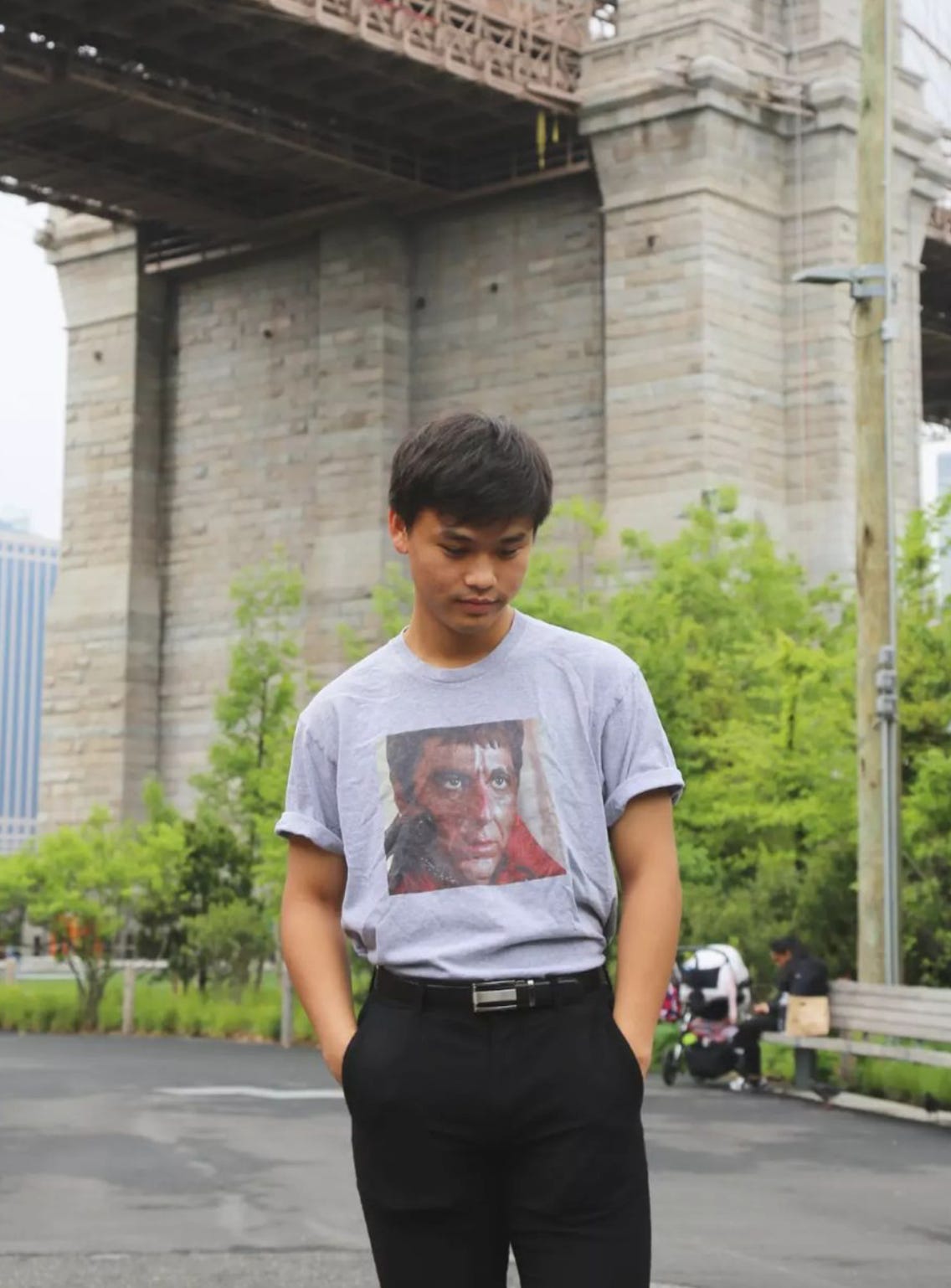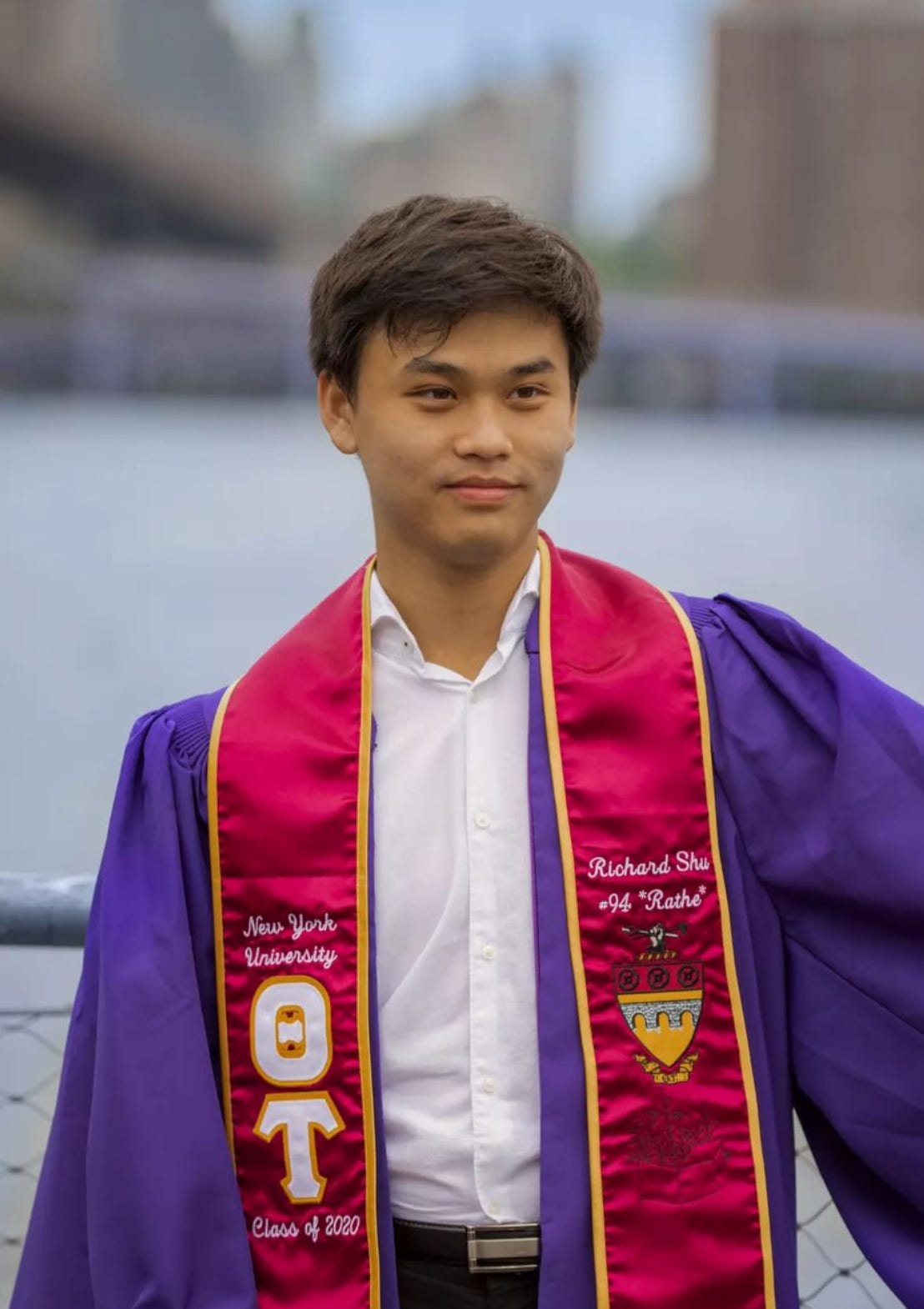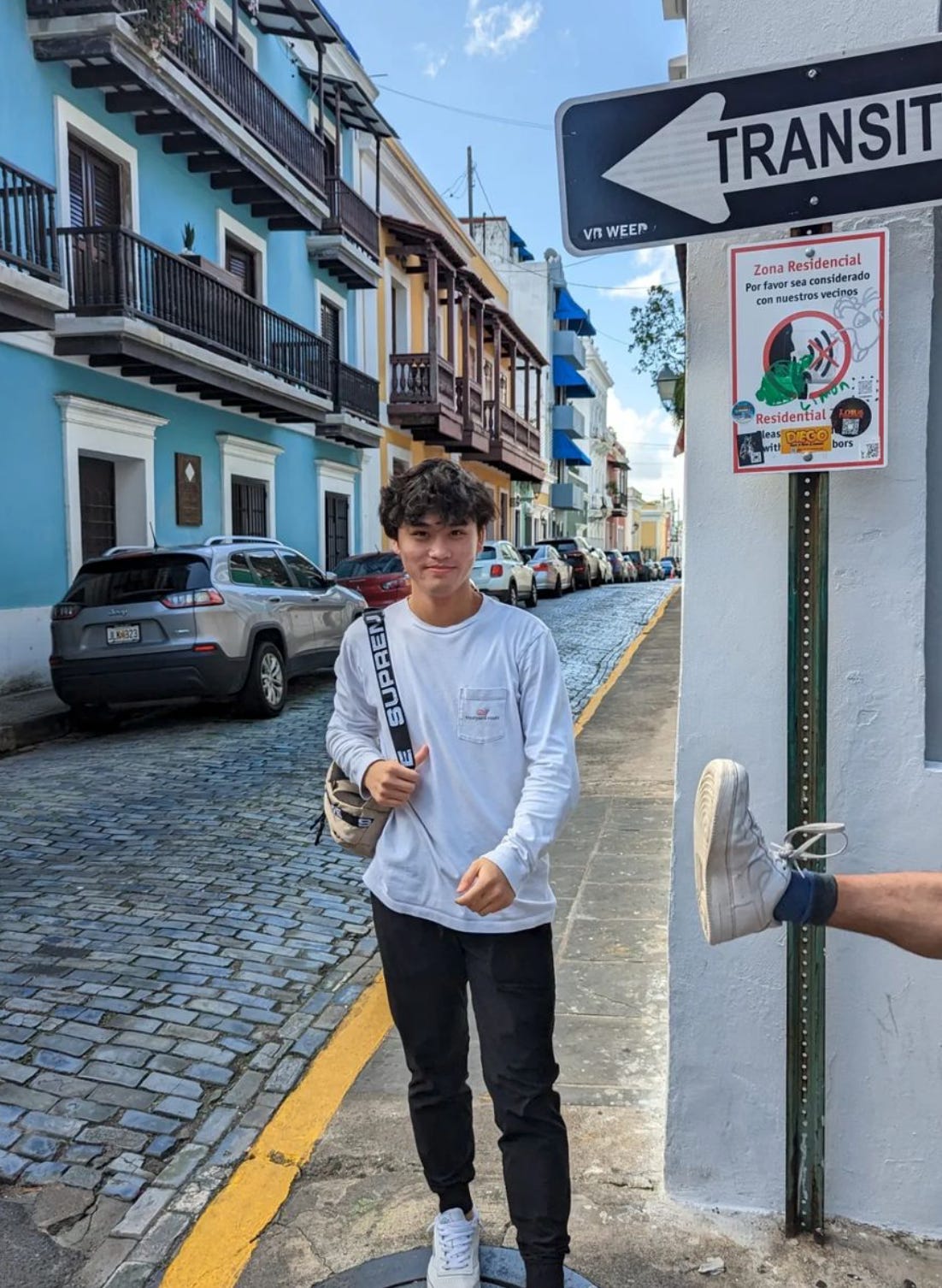Final 52 Stories interview: Richard Shu - Software Engineer on graduating during COVID
Interviewed in 2020 - this is the last interview of this project and I couldn't be happier to present Richard's interview as my final one.
I met Richard in the most serendipitous of places - a hip hop dance class in Hell’s Kitchen where we were partners for the class and danced to Señorita. It was my first (and only) time going to this class and Richard had been a regular for a while over the summer. I walked into that class as a dare to myself to try something new out of my comfort zone and while I loved the hip hop exercise classes I had taken before on Classpass, I wanted to learn choreography, which I knew was not my strong suit.
I did not walk into the class thinking that we would have to be paired with a partner which was one of my all time fears. Richard happened to be an excellent dance partner and we became friends afterwards. At the time, he was a senior majoring in Computer Science at New York University and was one of those people that you could easily get along with quickly.
I wanted to get his perspective on life and New York since he is quite a bit younger than I am and was also going through a different phase of life from my friends and I when COVID struck. He is incredibly thoughtful and reflective, so I knew I wanted to pick his brain during this time on earth where we are all experiencing a global pandemic for the first time (and for a few people - a second time).
These answers were written by Richard back during the summer of 2020.
You just graduated from NYU, congratulations! This has been quite a unique time with a global pandemic striking in March. Can you describe what your last semester at NYU was like and what your feelings were during graduation?
My final semester at NYU was a flurry of activity: catching up with friends, pursuing new interests, and settling back into the circadian rhythm of the city.
I had just returned from a semester abroad in Shanghai and was acclimating to the various flavors of New York, namely the brisk weather, grimy streets, and subway system which still confuses me to this day. But soon I found myself back at home, back to normalcy.
In the mornings, I’d slip out of my dorm room at 7:15 AM, ride the shuttle to main campus, and grab a bagel before my 8 AM marketing class at Stern. Between classes, I’d go to the gym or bury myself in Bobst Library. And on weekends, I’d wander the streets of NYC with a friend to try out the plethora of iconic restaurants and dessert shops generously sprinkled around the city.
But then in early March, classes went online.
I found myself watching lectures through Zoom—sideways—on my bed and raising my hand (virtually) to answer questions. The streets began to look a little less crowded. Restaurants were closing down. And even the first rave I bought tickets for had evaporated from existence. Spring break was filled with gloom and uncertainty.
Then the email came without notice:
“We are closing the student residences at our New York campus – students must be out by no later than March 22, and preferably within 48 hours.”
Suddenly, spring break became a frenzied rush to book flights and get home as soon as possible. Students who had flown home prematurely were now stuck in a dilemma where they could either fly back and move out immediately or wait months for NYU to pack and ship their belongings. I jumped on a call with my parents and within the hour booked a flight back to LA the next day. I packed my suitcase in record time, emptied the condiments from my fridge, and said goodbye to a few friends before being whisked away in a cab to LaGuardia Airport.
The ride gave me a moment’s pause to collect my thoughts and reflect on the semester. I had done a lot of things: organized a hackathon, attended a poetry reading, went to a few breakdance sessions, played intramural basketball, explored Latin & ballroom dance classes, gave a talk, and attended my first kpop concert. But I spent more time dwelling on the things I couldn’t do. No senior sendoff. No bumping into friends at K-Town or Washington Square Park. And no more Skyline sandwiches at 3:00 AM in the morning.
Graduation wasn’t how it should have been. No flowy graduation gowns or esteemed commencement speaker or flying my parents out to see me walk the stage at Yankee Stadium. Instead we got a YouTube video. No doubt it was high production and inspirational, but my two seconds of screen time were a bit anticlimactic and underwhelming.
Graduating during a global pandemic made me realize how much I appreciate picking out my outfit in the morning, inflating my lungs with crisp New England air during the walk to class, and cherishing the people around me. But hey, half of my dorming fee was refunded and I get to see my parents!
Can you shed insight on what it's like to be a new grad in this environment?
To be honest, job hunting has been rather difficult. It’s hard to tell if I’m struggling to get my foot in the door due to hiring freezes or lack of experience. Perhaps both. Even with referrals to Facebook and Google, I didn’t clear the résumé screening rounds. [Edit: Richard now works at Google!]
But that’s okay. I’m in the interview pipeline for a few other tech companies and investment firms, and I’m sure that wherever I end up, I’ll turn out just fine. Wading around in interview pools can be stressful, but it makes me feel alive. And whenever I fail an interview, I remind myself that all my efforts on LeetCode and interview prep have not gone down in vain but that I’m only preparing for the next one.
You have a lot of interests: dancing, YouTube, your new podcast, and writing on Medium. I love all of these creative pursuits and would like to know what was your inspiration behind each of them:
Dancing was a very spontaneous activity I picked up during my internship in New York. I was scrolling through Hinge, and a familiar face popped up. It was another intern from JPMorgan who I met on the second day of work. One of her profile prompts was something along the lines of, “Together, we could try out dance classes.” Of course, I messaged her, and she told me about the dance studio she went to—House of Movement—which happened to be a twenty minute walk from my office. How convenient! I bought the 3-class pack, fell in love with the choreo and lively atmosphere, and decided to pull the trigger and buy a 1-month pass so I could come in and take classes at will. Over the next month, I learned how to groove, tut, and isolate certain parts of my body. I wasn’t great, but I found the dance community to be incredibly supportive. I’d get back to my apartment at 10:30 PM every night sweaty, exhausted, and doughy but fulfilled that I had tackled something outside my comfort zone.
I’ve always dabbled with this idea of becoming a vlogger. Initially, I was inspired by those “Day in the Life” vlogs from Silicon Valley tech YouTubers at FAANG companies. As a lowly computer science student, I gravitated towards these creators in the hopes of following their footsteps and landing a job at a prestigious tech company. Naturally, my first video was an attempt to make a day in the life of a computer science student. Throughout the school year, I carried my tripod around and filmed my adventures: going to hackathons, interning at JPMorgan, and even studying abroad. Vlogging, I learned, is exhilarating because it requires a delicate balance of improvisation and planning (i.e. scripting, b-roll, transitions). Too much improv and your video lacks clarity and structure. Too much planning and your video lacks authenticity. It also requires guts to speak into a camera in public and set up shots in a crowded environment. And a lot of things can go wrong: windy audio, forgetting to shoot a scene, or running out of storage or battery. But the beauty of the craft is that with every new video, you improve as a filmmaker and your vlogs become more cinematic. Nowadays, I don’t pump out many videos due to the sheer amount of time and effort that editing demands (a 10-minute vlog can take upwards of 8 hours to edit), but I see it as a fun side project and outlet to meet interesting people. I’ve had plenty of people reach out to me for advice on getting into college or landing internships, and it’s rewarding to have a positive impact on even a small part of their lives.
Starting a podcast was borne out of a desire to experiment with new creative outlets. While stalking friends on LinkedIn, I somehow ended up on the profile page for someone who I’d met years ago at a networking event in Downtown LA. She had recently graduated from university and was working in the Bay. What caught my eye was her podcast featured at the top of her profile with a loaf-ly title: Eat Your Crust. I listened to a few episodes and was hooked. The casual conversations about navigating post-grad life resonated with me, and I found myself tuning in every Wednesday while doing mundane chores around the house or playing basketball in the front yard. I texted a close friend of mine and pitched the idea of bringing on our friends every week to talk about whatever makes them interesting: life at a top 5 law firm, creating a viral Instagram account, or joining/regretting Greek life. To my surprise he was down, and the rest is history.
Writing on Medium was directly inspired by my favorite writer Yehong Zhu. She has an impressive portfolio of gorgeous, gorgeous prose spanning creative writing, expository writing, journalism, interviews, you name it. My interest in writing actually originated from Quora where I first discovered Yehong and began answering random questions about chess and college life. After reaching out to her and learning about how she acquired her authorial voice, I began to incorporate more of her rhetoric into my writing. Unfortunately, writing inspiration comes and goes. I’m lucky if I get a fleeting moment of inspiration because without it I wouldn’t be pumping out a grand total of two articles a year.
You also were a software engineering intern at JP Morgan. What was that like and what is your thought process in terms of what you want for your next career move as you embark on your next journey?
JPMorgan was a totally new experience for me. I had never worked at a large company before, and now I was working at one of the world’s largest banks.
Orientation day was grand. A thousand interns dressed sharply in business formal attire. Breakfast in a massive ballroom with chandeliers. And opening remarks from managing directors who radiated corporate sophistication and IQ.
A day in my life meant waking up at 7:30 AM, throwing on a polo and slacks, and riding up one of the dizzying amount of high-speed elevators to the 25th floor. For lunch, I’d join the other interns at the cafeteria. And every now and then, I’d schedule a coffee chat with my manager or go on a boba run with my mentor. At 5:00 PM I’d clock out, head home for a quick dinner, and catch the train to House of Movement.
Over the next 10 weeks, I listened to world-class leaders through our speaker series. I sat 6 feet away from Jamie Dimon as he answered questions from the intern cohort, had a chat with Lori Beer, and listened to panels of managing directors. I also received some swag: an Origaudio backpack, an iconic navy canvas banker bag, and a moleskine notebook.
Along the way, I honed my technical skills. I learned to use Python and data analysis libraries like Pandas and NumPy to build data pipelines and augment a financial market API with technical indicators. I also learned how to test my code and deploy it to a massive codebase via continuous integration.
Overall, it was a great experience.
On the last day of the internship, I received a call with a return offer to join full-time but decided to roll the dice and continue interviewing at other companies in the hopes of pivoting to a tech company. I can’t say it was the most rational decision; most of my friends accepted their offers with glee while I cast aside my safety net, but I went with my gut.
From my experience in finance, software engineers function more as a support role. They’re not exactly first-class citizens because they’re not the driving force of the company. Traders are. In a tech company, the software engineers are the ones driving innovation and revenue, so they receive a lot more perks. That said, perks aren’t my primary concern. I’m more concerned about the impact of my work. In finance, you build tools for traders and quants, but that's all internal. At a tech company, your end users are more likely to be regular people who can appreciate the fruits of your labor.
Having spent one semester in Shanghai at NYU Shanghai (link to Medium article here), what would you say was the biggest thing you learned from that experience abroad?
To set aside time for exploration. I really struggled with this because I didn’t have the best time management. I’d often decline invitations to go out so I could finish homework over the weekend when I could have done so during the week. Every weekend (and weeknight) is an opportunity to embrace wanderlust and visit a new museum, garden, restaurant, bar, or nightclub. You’ll expand your cultural palate, make new friends, and build up a neat album of memories that you can look back on for the rest of your life. And someday you might even end up back in the city with a keen eye and a checklist of which spots to hit.
You're in LA now! Team LA or NY and why? Where do you want to be long term?
The Elements: It is dumb brick in NY. Living in NY, I’ve come to realize that your wardrobe is very seasonal. During the winter, half of your wardrobe is off limits, and during the summer, the other half is ruled out. In LA, I don’t have to worry about layering up. I can throw on a t-shirt and jeans year-round and still survive the cold. And the summers get hot, not humid. LA beats NY hands down.
Expenditures: NY is a bit too expensive for my taste. A meal out will average $15 to $30. Don’t even get me started on the grocery stores. If it weren’t for Trader Joe’s, I’d be buying dollar pizza everyday. LA is effectively half the price. On the other hand, rent is debatable; apartments range widely with some being very affordable and others being astronomically high in both cities.
Eateries: This is a hard one. I think that NY has a greater variety of cuisines to explore, but LA has consistently good food. I have a few go-to restaurants in LA but can’t say the same about NY. That said, I love how in NY I can pick a direction, walk forward, and find a delightful, cozy hole-in-the-wall restaurant wherever I go.
Entertainment: Can’t deny that NY is a fun place to live. Everyone is pretty much a 25-minute train ride away, so it’s really easy to meet up with friends and hang out at each others’ apartments. Conversely, LA traffic is quite death and our public transportation is mediocre at best, making hanging out with others inefficient and cumbersome. I can’t say I’ve taken advantage of the NY nightlife scene, but I know for a fact it’s better than LA’s.
Environment: NY truly is a concrete jungle. There’s not enough greenery, it’s too cramped in apartments, and touching the subway pole will probably give you stage III cancer. It’s gross. Downtown LA can be equally gross, but hey, at least we have plenty of parks, a lot more space, and you don’t have to choke on smoke every time you step outside of a building.
I have to go with LA! Sorry my NY friends.
As everyone adjusts to the new environment that COVID has thrust upon us, what would you say has changed about your routine or daily living and what do you like or dislike about this type of environment?
Nowadays, there’s isn’t much structure in my life. I can sleep late and wake up whenever. There’s very little external pressure to achieve grand things and be productive.
Lately, YouTube has been very selfish of my time. I constantly find myself binging Conan and Elliot Choy videos. I’ll often do work on my laptop while lying in bed. And exercise has been “virtually” nonexistent.
But every now and then I’ll muster up the courage to practice my free throws in the front yard or make a YouTube video. Working on the podcast has also added structure and direction to my life.
These times have certainly been a test of discipline where I’m left to my own vices, but I’ve learned that if I’m ever going to work on my time management and get anywhere, now’s the time to prosper.






